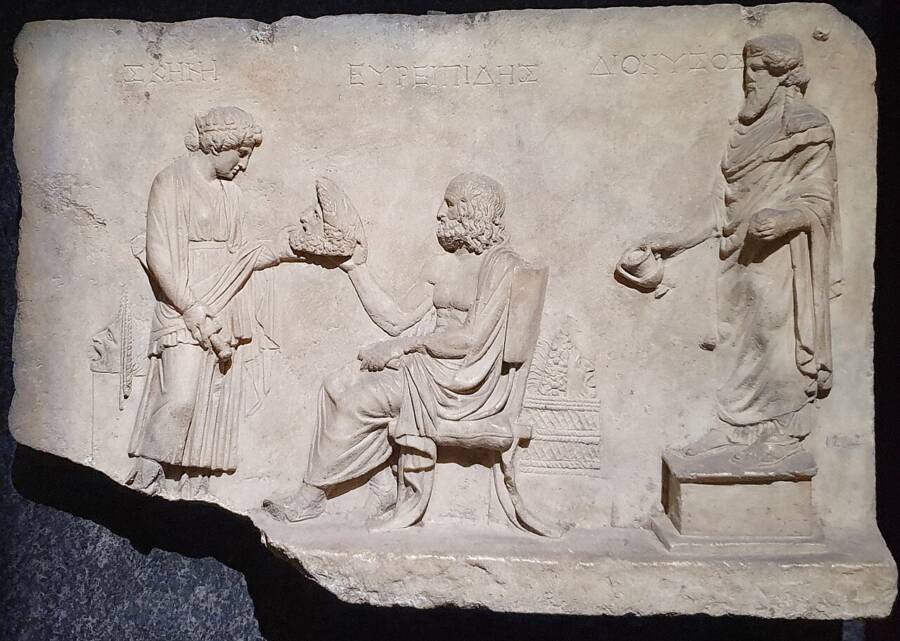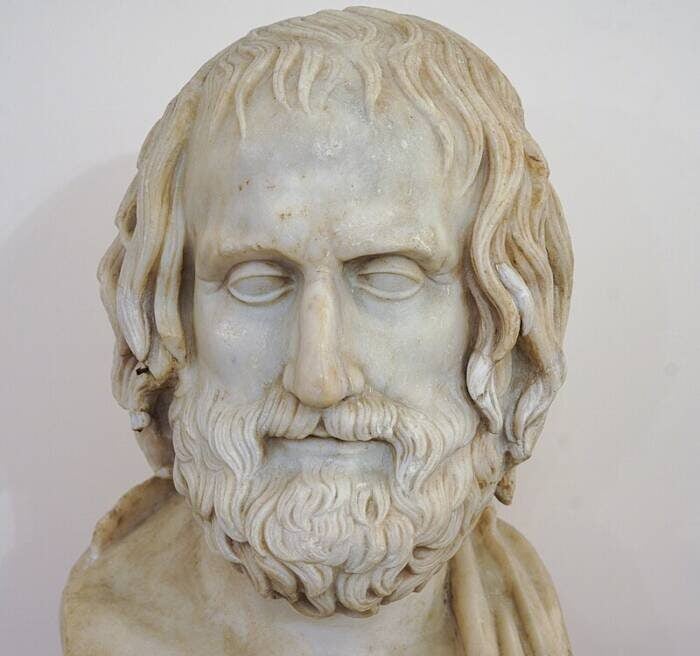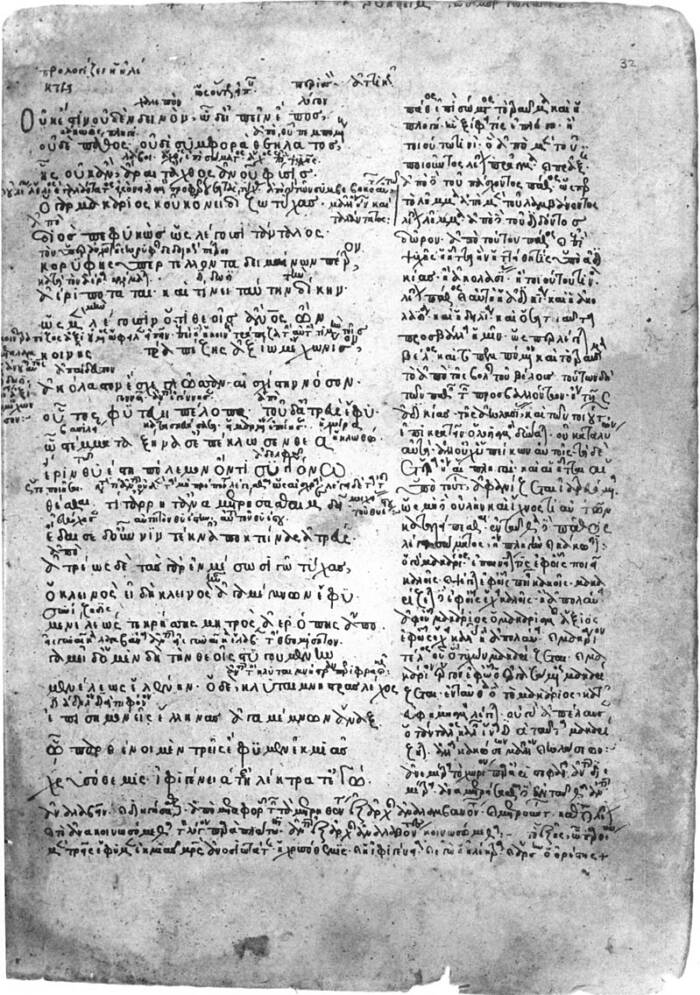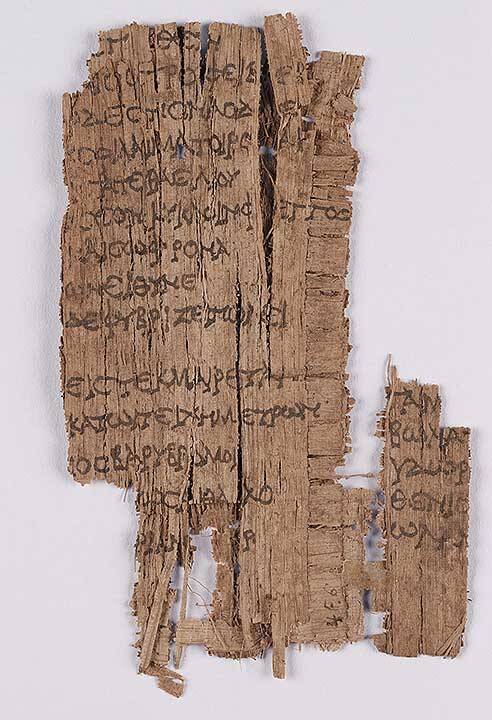Scholars from the University of Colorado Boulder have found excerpts of the Euripides plays Polyidus and Ino in a discovery unlike anything in decades.

Wikimedia CommonsPerhaps the most famous playwright in ancient Greece, Euripides remains iconic to this day for the landmark tragedies he wrote in the 5th century B.C.E., including Medea, Hippolytus, and Electra.
In late 2022, the Egyptian Ministry of Tourism and Antiquities sent Yvona Trnka-Amrhein, assistant professor of classics at the University of Colorado Boulder, a digitized copy of an ancient Egyptian papyrus.
Soon, she discovered that this papyrus contained fragments of lost Euripides tragedies. One of the most significant playwrights of ancient Greece, Euripides lived in the 5th century B.C.E. and is believed to have written more than 90 plays, including some that have helped shape the course of Western drama as a whole ever since.
Alongside Euripides expert and fellow professor John Gibert, Trnka-Amrhein discovered that the papyrus contained previously unknown scenes from the plays Polyidus and Ino. This astonishing find represents the first discovery of its kind in decades.
How Scholars Discovered Lost Fragments Of Two Euripides Tragedies

University of Colorado BoulderUniversity of Colorado Boulder classicists Yvona Trnka-Amrhein (left) and John Gibert (right).
In November 2022, Basem Gehad, an archaeologist with the Egyptian Ministry of Tourism and Antiquities sent Yvona Trnka-Amrhein, assistant professor of classics at the University of Colorado Boulder, a recently discovered, 10.5-square-inch papyrus unearthed at the remains of the ancient Egyptian city of Philadelphia.
Because Egyptian law prevents researchers from removing artifacts from the country, Trnka-Amrhein had only a digital copy at her disposal.
After months of analyzing the papyrus’ 98 lines using Thesaurus Linguae Graecae, a database of ancient Greek texts from the University of California, Irvine, Trnka-Amrhein realized she had uncovered a copy of an ancient Greek tragedy from the historic playwright Euripides.
“It was very clearly tragedy,” she told the university in a recent statement. “After more digging, I realized I should call in an expert in Euripides fragments. Luckily, my mentor in the department is just that!”

Wikimedia CommonsA bust of Euripides, one of the most renowned playwrights of ancient Greece.
Alongside her mentor and colleague, Professor John Gibert, Trnka-Amrhein spent months studying the papyrus fragments. Eventually, the two felt confident that they were staring at new material from two Euripides plays, Polyidus and Ino.
Some of this content was known, but “80 percent was brand-new stuff,” Gibert stated. “We don’t think there has been a find of this significance since the 1960s.”
The New Material From Euripides’ Plays Polyidus And Ino

Public DomainA 14th-century copy of another one of Euripides’ plays, Orestes.
Euripides’ play Polyidus retells a Cretan myth of King Minos and Queen Pasiphaë asking for the resurrection of their son, Glaucus, after he drowned in a vat of honey.
“Actually, it has a relatively happy ending. It’s not one of these tragedies where everyone winds up dead,” Trnka-Amrhein said. The main character, Polyidus, eventually revives Glaucus using herbs.
The recently discovered papyrus contains a scene between King Minos and Polyidus discussing whether or not it’s right to resurrect the dead.

University of Illinois Urbana-ChampaignA separate ancient papyrus containing excerpts from Euripides’ Phoenissae.
In Euripides’ more well-known play Ino, the main character, Ino, is the Princess of Thebes and the aunt of the Greek god Dionysus. Ino is an evil character trying to kill her husband’s children from a previous marriage.
However, the recently discovered papyrus puts a new spin on the original story.
“Another woman is the evil stepmother, and Ino is the victim,” Trnka-Amrhein stated. “The third wife of the king is trying to eliminate Ino’s children. Ino turns the tables on her, causing her to kill her own children and commit suicide. It’s a more traditional tragedy: death, mayhem, suicide.”
For now, however, more study is needed regarding this interpretation of the text. Both Trnka-Amrhein and Gibert have already begun presenting their findings to the academic community. Then, their next step is to publish their findings and hold the Ninth Fountain Symposium at the University of Colorado Boulder on September 14 before traveling around the country.
“John’s contacts and readers in the Euripides world have given us reassurance we’re not going to have too much pie on our faces,” Trnka-Amrhein stated. “We feel extremely lucky to have worked on this material and look forward to the world’s reactions.”
In addition to this discovery, earlier in 2024, both Trnka-Amrhein and Gehad collaborated on another project that resulted in the discovery of the missing half of a Ramses II statue in Egypt’s Minya Governorate.
Now, Trnka-Amrhein surely hopes to make waves in the world of archaeology yet again for this landmark find concerning the lost works of Euripides.
After reading about these newly-uncovered Euripides excerpts, dive into the story of the Rosetta Stone and how it unlocked the mystery of Egyptian hieroglyphics. Then, read about the disturbing story of Hades, the Greek god of the Underworld.





